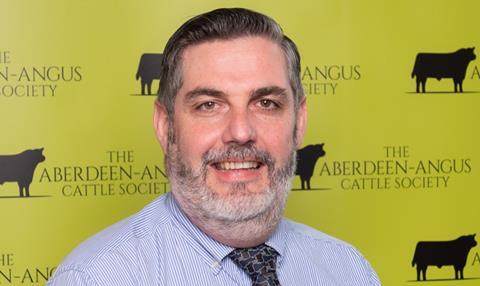With the value of native beef genetics growing, including breeds such as Aberdeen-Angus, producers point out that they can “tick the boxes” at all tiers within the UK beef supply chain.

Often better suited to grass-based, lower input systems than some continental breeds, the Aberdeen-Angus Cattle Society (AACS) is one organisation championing native genetics which it claims offer the potential to boost producer margins and support environmental goals, while delivering a consistently high-quality end product.
Robert Gilchrist, CEO at the Aberdeen-Angus Cattle Society, believes that as a result, the industry is seeing significant growth in their use.
He commented: “As subsidies drop off and input costs continue to rise, beef farmers have had to start looking at ways to enhance their resilience, which has resulted in a significant increase in native breed BCMS registrations over the last 10 years.
“Aberdeen-Angus calf registrations have increased significantly and they’re now top of the list with 471,528 registrations in 2021. 4% growth has been seen in the last year, accounting for 24.41% of beef calves.
“More farmers are recognising that the lower input systems, where cattle can be predominantly finished off forage and grass-based diets, is a much more sustainable and financially viable way of producing beef, as the agricultural sector faces so much uncertainty.”
Gilchrist added: “The nature of the reduced inputs required for an extensive beef system means they tend to have a lower cost of production and be more environmentally sustainable.”
Mr Gilchrist also said that the benefits extend much further than just farmers within the supply chain, commenting: “From a consumer perspective, the intramuscular fat that native breeds offer provides the marbling which consumers desire, making it easier to cook. This gives a more consistent eating experience, which is fundamental in getting people to purchase beef on a regular basis.”
In a statement ACCS say that spiralling feed costs has recently highlighted major vulnerability within the meat supply chain, with pork and chicken heavily affected due to their reliance on concentrate feed. Mr Gilchrist believes that building a beef supply chain that focuses on producing meat from grass, is more resilient and sustainable.
“Beef is renowned for being a premium product and therefore typically a more expensive option than white meat. However, if we can develop a more sustainable beef supply chain at all levels, then we will be better placed to compete with other proteins in the future.” He concluded.
This story was originally published on a previous version of the Meat Management website and so there may be some missing images and formatting issues.












